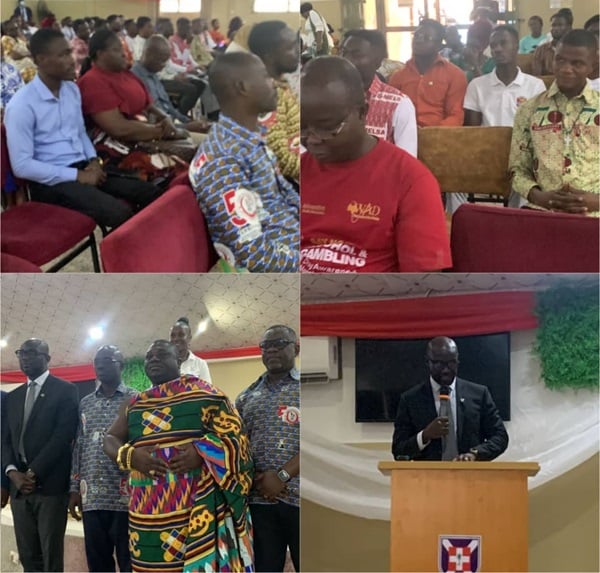Paragraph 1: The Crucial Role of Medical Laboratories in Ghana’s Healthcare System
Dr. Fred Adomako Boateng, the Ashanti Regional Director of the Ghana Health Service, has emphasized the indispensable role of medical laboratories in Ghana’s healthcare system. He underscored that effective laboratory systems are fundamental to accurate diagnosis, treatment, disease surveillance, and ultimately, the overall success of healthcare delivery. Dr. Boateng argued that no healthcare system can truly thrive without well-equipped laboratories staffed with adequately trained professionals. He stressed that timely and accurate testing is paramount in addressing both common and emerging health threats, forming the bedrock of effective disease management and prevention.
Paragraph 2: The Dire State of Ghana’s Medical Laboratories and the Call for Investment
Dr. Adomako Boateng expressed concern over the current state of many medical laboratories in Ghana. He lamented that numerous facilities operate under suboptimal conditions, lacking updated equipment and resources, which compromises efficiency and diagnostic accuracy. This situation, he argued, hinders the ability of the health system to effectively address existing and emerging health challenges. He issued a strong call to the government and relevant stakeholders to prioritize investing in upgrading laboratory infrastructure and ensuring a consistent supply of modern equipment, reagents, and essential diagnostic materials. This investment, he asserted, is crucial for enabling laboratories to perform their vital functions effectively.
Paragraph 3: The Need for Robust Laboratory Infrastructure to Combat Emerging Threats
The Ashanti Regional Health Director highlighted the escalating threat of emerging infectious diseases and antimicrobial resistance, emphasizing that these challenges demand swift, reliable, and evidence-based responses. He stressed that equipping laboratories with the necessary resources and expertise is the only way to achieve this. Dr. Adomako Boateng’s remarks were made at the 2025 Annual Regional Congress of the Ghana Association of Medical Laboratory Scientists (GAMLS) held in Kumasi. The congress focused on the theme: “The laboratory’s critical role in tackling emerging infectious disease threats and antimicrobial resistance in Ghana,” underscoring the timely nature of his concerns.
Paragraph 4: GAMLS President Echoes the Call for Investment and Highlights Human Resource Needs
Dr. Eric Kofi Aidoo, President of GAMLS, echoed Dr. Adomako Boateng’s call for substantial government investment in laboratory systems. He described these systems as a critical pillar of Ghana’s healthcare framework and advocated for the provision of modern infrastructure, tools, and technologies to bolster diagnostic services nationwide. Beyond infrastructure, Dr. Aidoo emphasized the crucial need for investment in human capital. He pointed out the existing paradox of unemployed yet highly qualified laboratory scientists and technicians in Ghana, despite a clear need for their expertise within the healthcare system.
Paragraph 5: Addressing the Human Resource Gap and Meeting International Standards
Dr. Aidoo argued that recruiting and retaining skilled laboratory personnel would effectively address service delivery gaps and elevate Ghana’s healthcare system to meet international standards, particularly in disease control and outbreak management. He highlighted the irony of having trained professionals remaining unemployed while hospitals and clinics face increasing patient demands and a shortage of skilled personnel. This investment in human resources, he asserted, is as crucial as investing in physical infrastructure and equipment. The timely recruitment of these professionals would significantly enhance the capacity of the health system.
Paragraph 6: Strengthening Laboratory Systems for Enhanced Healthcare and Global Health Security
The GAMLS Congress served as a platform for laboratory scientists to discuss strategies for improving service delivery and professional standards. Discussions centered on the crucial role of laboratory services in early disease detection, accurate data collection for policy-making, and supporting clinical decisions. Stakeholders at the event concurred that bolstering laboratory systems is essential for improving Ghana’s preparedness for future health crises, reducing misdiagnosis rates, and significantly contributing to achieving universal health coverage. This collective call to action, voiced by Dr. Adomako Boateng, Dr. Aidoo, and other health professionals, underscores the recognized importance of robust laboratory systems not only for enhancing patient care but also for strengthening Ghana’s ability to respond effectively to global health challenges.


